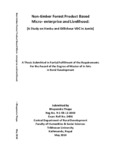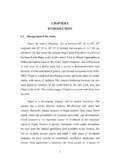Please use this identifier to cite or link to this item:
https://elibrary.tucl.edu.np/handle/123456789/3382| Title: | Non-timber Forest Product Based Micro- enterprise and Livelihood: [A Study on Hanku and Dillichaur VDC in Jumla] |
| Authors: | Thapa, Bhupendra |
| Keywords: | Forest Product;Enterprises |
| Issue Date: | 2010 |
| Publisher: | Central Department of Rural Development |
| Institute Name: | Central Department of Rural Development |
| Level: | Masters |
| Abstract: | The research entitled study on "NTFP based micro-enterprises and livelihood " was carried out in two VDC in Jumla district. The main aims of the study was to assess the availability and use of of NTFP resource for micro enterprises in Jumla district, to identify existing practice in NTFP resource in the study areas ,to analyze the impact of NTFP based micro enterprises on livelihood of Jumli people, to enlist the potential and constrain of NTFP based enterprises development in Jumla district.This study relies on a combination of intensive fieldwork and literature review to analysis prospect and problem of NTFP based micro enterprise development in Jumla district. Micro enterprises has long negligence history in Nepal but after 9th Five Year plan ,government has paid sincere attention to his sector and formulated many Acts and policies in the industrial sector for its development. The three interim plan has given higher priority to micro enterprises development. To support Nepal's poverty reduction efforts, the Micro –enterprises Development Program (MEDEP) has launched since 1998 with help of Ministry of Industry and UNDP. Direct observation and field visit, household survey, Key Informant Interview, Focus Group Discussion and used for the primary data collection .secondary data were collected through the review of various books, periodic Journals, published and unpublished literatures. The data thus collected were analyzed qualitatively and quantatively. In the study researcher has found that there are 110 types herbal plants available in jumla which major 28 herbal plants,6 fiber yielding NTFPs and 13 food species have found in the study area .There are many NTFPs available in the district but only 8 herbal plants, 1 fiber plants and more than one food species are being used for income generation and enterprises purpose. Local people are solely depended upon the non –timber forest resource of their survival and livelihood. The awareness level is very low about NTFP which is only 13.3 percent of respondent are aware in the study are. Existing harvesting system is followed by the un scientific method and NTFP resource is managed by community based organization such as heralo and Palo system. Other hand 92 leasehold forestry user groups are formed through social Mobilization and cultivation of NTFP in 33 ha. land of leasehold which is hand over in Jumla district .Majority of the house (85%) are involved NTFP based enterprise which is major source to support livelihood of the people in the study area .47.34% of the cash income of the respondent households are depended on NTFP micro enterprises ( raw trading ,semi –processing and processing). At present, various type of NTFP based enterprises are starting now by the support of different NGO and private farm above them Herbal tea production and sinke Dhupa are successful enterprises that describe benefits of the local value addition Both many potentiality as well as constrains are existing in the sector of NTFP based micro enterprises. Two processing unit are establishing for promoting NTFP based enterprises and District Development committee is also declared NTFP as a priority sector in terms of potentiality of NTFP in district which is included in the Periodic plan. The main constrains of NTFP based micro enterprises are lack awareness about NTFP, long term functioning processing , lack of marketing product ,transportation problem of products ,problem in the registration of enterprise , high demand of NTFP resource for to full basic needs, haphazard collection of NTFP and low cultivation practices which creats problem in establishment NTFP based micro enterprises. Finally, the research reveals that NTFP sub sector in our country large potential and it is an easy to reduce rural poverty and contribute the national economy through micro enterprises. Women, Youth and educated persons from the deprived group should be lured to become entrepreneurs or self employed. |
| URI: | http://elibrary.tucl.edu.np/handle/123456789/3382 |
| Appears in Collections: | Rural Development |
Files in This Item:
| File | Description | Size | Format | |
|---|---|---|---|---|
| Cover.pdf | 64.68 kB | Adobe PDF |  View/Open | |
| Chapter.pdf | 566.37 kB | Adobe PDF |  View/Open |
Items in DSpace are protected by copyright, with all rights reserved, unless otherwise indicated.
